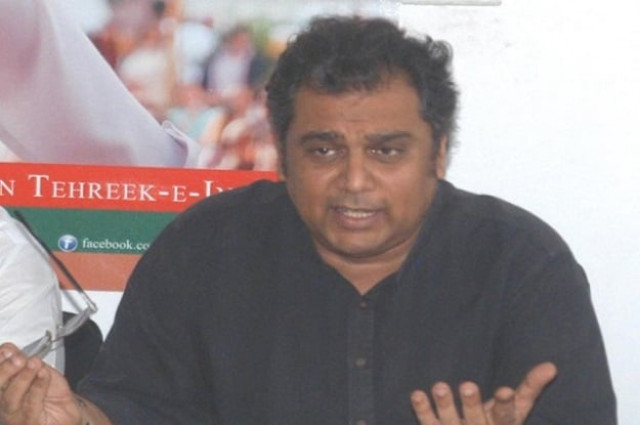SHC asks PTI leader's lawyer to argue on maintainability of petition
Ali Haider Zaidi approached court for publication of JIT reports on Uzair Baloch's crimes and others

PTI leader Ali Haider Zaidi. PHOTO: NNI
Headed by Chief Justice Ahmed Ali M Shaikh, a two-judge bench adjourned the hearing on a date to be later notified by the office.
Earlier, a law officer representing the provincial government raised objections on the maintainability of the petition, arguing that the petitioner had no locus standi to file the petition.
In October last year, the PTI leader had approached the court against the provincial chief secretary for not providing reports of the joint investigation teams (JITs) that had investigated the Baldia factory fire incident, alleged crimes of Lyari gang-war kingpin Uzair Baloch and cases against former Fishermen Cooperative Society chairperson Nisar Morai. The petitioner had sought such reports under the Sindh Transparency and Right to Information Act, 2011.
Six additional judges sworn in at SHC
Zaidi had approached the SHC a few days after the police had submitted a confessional statement of Baloch recorded in the presence of a judicial magistrate, in which he had made startling disclosures of committing criminal activities in connivance with the senior leadership of the Pakistan Peoples Party (PPP) and police officers.
The arrested gangster had named former president and PPP Co-Chairperson Asif Ali Zardari, his sister MNA Faryal Talpur, Senator Yousuf Baloch, former Senator Faisal Raza Abidi, former provincial minister Sharjeel Inam Memon, former Karachi city police chief Waseem Ahmed, SSP Farooq Awan, his brother and current prosecutor-general Shahadat Awan, and others as his collaborators in various crimes in the statement.
In the petition, Zaidi had argued that the Sindh Transparency and Right to Information Act, 2011 had been passed by the Sindh Assembly, which granted him the right to obtain the information in line with the Act. The PTI leader claimed that he had requested the chief secretary multiple times to provide copies of the JIT reports but the respondent failed to provide the required information.
The petitioner, represented by Barrister Muhammad Umer Soomro, argued that families of the victims of the Lyari gang-war, Baldia factory fire and those aggrieved by crimes committed by Morai deserved justice. However, due to the concealment of the JIT reports, the families were unaware of the culprits involved in those crimes.
"The publication of the JIT reports is important to ensure that the true culprits are not able to evade justice," Zaidi argued, citing that the print and electronic media had reported that during investigations, the JITs obtained evidence of the involvement of various politicians in these crimes.
Naqeebullah murder case: Court extends remand of six suspects
The PTI leader argued that it was imperative that the politicians involved in crimes are brought to book. However, he apprehended that as long as the JIT reports were kept secret, the involvement of these politicians will not be known to the public, leaving the politicians to quietly exercise their influence and quash any investigations launched against them.
"The publication of the JIT reports is important as there are allegations that state machinery was utilised to commit and cover up crimes and the people have a right to know if public resources were used for this purpose," Zaidi argued.
The petitioner also stated that the very purpose of constituting the JITs, which were formed to uncover the truth of these crimes, will be defeated if the reports were not released.
The petitioner informed the court that the precedence of making investigation reports public had been set by the Lahore High Court, which had, on September 21 last year, ordered the report of Justice Ali Baqar Najfi on the Model Town massacre in Lahore to be made public.
It was also argued that the failure of the Sindh authorities to make the JIT reports public was a violation of the right to information guaranteed under Article 19-A of the Constitution.



















COMMENTS
Comments are moderated and generally will be posted if they are on-topic and not abusive.
For more information, please see our Comments FAQ